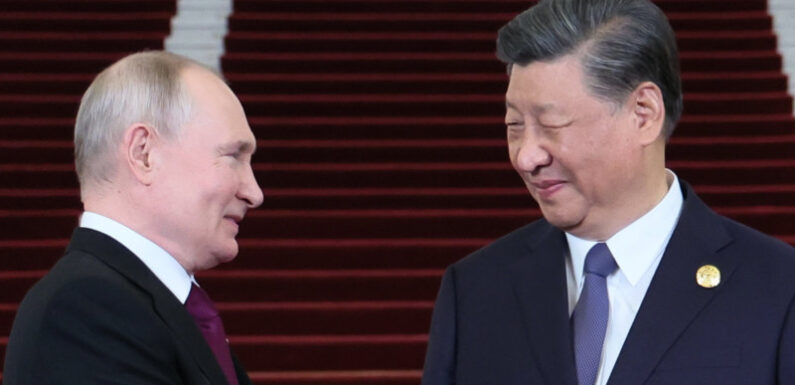
Save articles for later
Add articles to your saved list and come back to them any time.
Singapore: Russian President Vladimir Putin has praised his Chinese counterpart Xi Jinping while calling on countries from South America to Africa to invest in a new sea route through the Arctic, which could slash shipping transport times between Asia and Europe in half.
In a speech to the Chinese president’s Belt and Road infrastructure forum in Beijing on Wednesday, Putin lauded his “dear friend” Xi’s multibillion-dollar investment fund, and made a case for multinational investment in the Northern Sea Route.
In a show of solidarity with Vladimir Putin, Xi Jinping led him into the forum at the Great Hall of the People in Beijing ahead of other leaders.Credit: AFP
“We invite interested states to participate directly in its development, and we are ready to provide reliable icebreaker navigation, communication and supply,” Putin said.
The distance from the Russian port of Murmansk to Yokohama in Japan is more than 12,000 nautical miles through the Suez Canal in the Middle East. It is only 5770 nautical miles through the Northern Sea Route.
But the Arctic route is currently only open two months of the year and would need massive ice breaking and infrastructure development to make it navigable.
Opening the route would also allow Russia to diversify its transport supply lines after being hit with billions of dollars in sanctions from the West for its war on Ukraine.
In a show of solidarity with Putin, Xi led him into the forum at the Great Hall of the People in Beijing ahead of other leaders on Wednesday. China has been reluctant to criticise Russia throughout the war in Ukraine and maintained a publicly neutral stance while supplying some arms such as drones, and increasing trade with its northern neighbour.
Xi used the opening of the Belt and Road Forum to amplify his calls to world leaders mostly from developing countries to resist restrictions by the Western-led international order.
“We stand against unilateral sanctions, economic coercion and decoupling and supply chain disruptions,” Xi said. “Ideology confrontation, geopolitical rivalry and bloc politics are not a choice for us.”
China has signed Belt and Road cooperation documents with 150 countries, but the infrastructure investment fund has also struggled as its economy wobbles. The program, which has been called the “project of the century” by Xi has built a high-speed railway in Indonesia, highways in Pakistan and stadiums in the Pacific, but has also battled with local governments struggling to repay their debts.
“China can only do well when the world is doing well. When China does well, the world will get even better,” Xi said.
“Countries taking the lead in economic development should give a hand to their partners who are yet to catch up. We should all treat each other as friends and partners, respect and support each other, and help each other succeed.”
The message resonated among the partners presented. Kazakhstan’s President Kassym-Jomart Tokayev said: “I am convinced that under the wise leadership of President Xi Jinping, China in the new era will create even more glorious achievements and make even more cooperation outcomes.”
Argentinian President Alberto Fernandez said he was willing to deepen cooperation with China in mining, climate change and finance after accusing the international community of abandoning South America’s second-largest economy.
From left in front row: Indonesian President Joko Widodo, Putin, Xi and Kazakhstan President Kassym-Jomart Tokayev with other leaders wave during a group photo session at the Belt and Road Forum in Beijing.Credit: AP
“China was our brother in need when the International Monetary Fund exerted pressure on us,” Fernandez said.
Prime Minister Abiy Ahmed Ali of Ethiopia said that China’s plans across the infrastructure and mining sectors were in harmony with Africa’s development strategy. “The continent that has been sidelined until now is harnessing the demographic dividend leveraging its natural dominance in resources,” he said.
Indonesian President Joko Widodo – who has been lobbied by Beijing, the United States and Australia and is seen as a vital diplomatic partner in the Asia-Pacific – warned against being forced to take sides.
“In an increasingly divided world, [Belt and Road] cooperation must not be politicised,” he said.
Widodo stands in front of the new, Chinese-built Jakarta-Bandung high speed railway earlier this month.Credit: AP
But Widodo also said the projects needed to be based on an equal partnership with local governments that used transparent funding models, local labour and domestic products.
UN secretary-general Antonio Guterres put the weight of the UN behind the $US1 trillion infrastructure initiative. “Without infrastructures, there can be no development and without development support, many developing countries will be starved of the infrastructure they desperately need,” he said.
“In this context, dramatic context for the developing countries. The relevance of the Belt and Road Initiative is undeniable.”
Christoph Nedopil, who leads the Griffith Asia Institute, said the Belt and Road Initiative had evolved since Xi announced it a decade ago.
“China sees itself very strongly as the largest developing country and therefore also potentially the most powerful developing country that can have a strong voice against Western-led institutions,” he said.
“This positioning as a clear alternative to the Western development model is I think an important evolution of the [Belt and Road].”
Get a note directly from our foreign correspondents on what’s making headlines around the world. Sign up for the weekly What in the World newsletter here.
Most Viewed in World
From our partners
Source: Read Full Article


